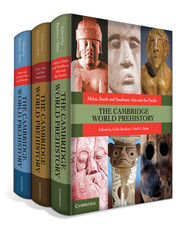Book contents
- Frontmatter
- Contents Summary for Volumes 1, 2 and 3
- Contents
- Volume 1 Maps
- Volume 2 Maps
- Volume 3 Maps
- About the Contributors
- Volume 1
- Volume 2
- V. East Asia
- 2.1 East Asia: DNA
- 2.2 Early Palaeolithic of Central and Northern Asia
- 2.3 The Upper Palaeolithic of Northeast Asia
- 2.4 Early Sedentism in East Asia: From Late Palaeolithic to Early Agricultural Societies in Insular East Asia
- 2.5 The Neolithic of Northern and Central China
- 2.6 The Neolithic of Southern China
- 2.7 Early Complex Societies in Northern China
- 2.8 Early Complex Societies in Southern China
- 2.9 China from Zhou to Tang
- 2.10 Complex Society in Korea and Japan
- 2.11 The Later Prehistory of the Russian Far East
- 2.12 East Asia: Languages
- VI. The Americas
- Volume 3
- Index
- References
2.7 - Early Complex Societies in Northern China
from V. - East Asia
Published online by Cambridge University Press: 05 August 2014
- Frontmatter
- Contents Summary for Volumes 1, 2 and 3
- Contents
- Volume 1 Maps
- Volume 2 Maps
- Volume 3 Maps
- About the Contributors
- Volume 1
- Volume 2
- V. East Asia
- 2.1 East Asia: DNA
- 2.2 Early Palaeolithic of Central and Northern Asia
- 2.3 The Upper Palaeolithic of Northeast Asia
- 2.4 Early Sedentism in East Asia: From Late Palaeolithic to Early Agricultural Societies in Insular East Asia
- 2.5 The Neolithic of Northern and Central China
- 2.6 The Neolithic of Southern China
- 2.7 Early Complex Societies in Northern China
- 2.8 Early Complex Societies in Southern China
- 2.9 China from Zhou to Tang
- 2.10 Complex Society in Korea and Japan
- 2.11 The Later Prehistory of the Russian Far East
- 2.12 East Asia: Languages
- VI. The Americas
- Volume 3
- Index
- References
Summary
- Type
- Chapter
- Information
- The Cambridge World Prehistory , pp. 782 - 806Publisher: Cambridge University PressPrint publication year: 2014
References
- 2
- Cited by

